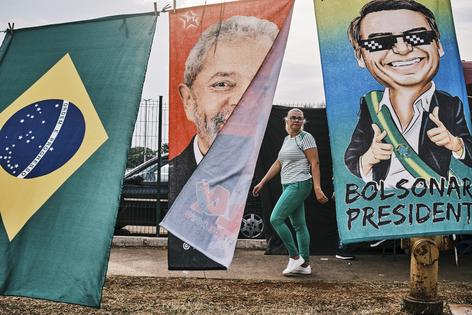Brazil's election goes beyond a battle between left and right – democracy is also on the ballot
Published in Political News
Two very different Brazils could emerge after voters go the polls to elect a president on Oct. 2, 2022.
In one scenario, Jair Bolsonaro, Brazil’s current president, will manage to stay in power – by either winning the vote or illegally ignoring it – and continue to push the country down an authoritarian road.
Alternately, the country will begin the process of rebuilding its democratic institutions, which have been undermined during Bolsonaro’s four years in power. That project will be the task of a broad center-left coalition led by former President Luiz Inácio Lula da Silva of the Workers Party.
As experts on Brazilian politics and modern Latin American history, we have studied Brazil from the ground up. Seen from afar, the dynamics playing out in the Brazilian election are a clear example of the broader crisis of liberal democracy, with right-wing authoritarians in ascent globally. But the high-stakes choice confronting Brazilians in this election has also been shaped by complicated social and political experiences unique to Brazil.
In the first decade of the 21st century, Brazil led a regionwide “pink tide” in which Latin America, governed largely by leftist presidents, experienced unprecedented levels of inclusive growth through democratic politics. Lula’s economic and welfare policies, for example, brought 30 million people out of poverty and provided lower-income, mostly nonwhite Brazilians with new opportunities for upward mobility.
After 2012, however, as Brazil’s economy slowed, traditional elites mobilized in order to resist this progressive path. Their efforts gained ground with an explosive corruption scandal, called “Lava Jato,” or “Car Wash.” Though politicians across the spectrum were implicated, the operation targeted the Workers Party in particular and generated widespread anger toward the party.
Subsequent anti-left sentiment, led by privileged groups and deftly managed through social media campaigns, grew to include voters across the economic and political spectrum. This provided a perfect opening for Bolsonaro, a former military captain and undistinguished congressman, to seize right-wing momentum. Building on the deepened polarization generated by the illegitimate impeachment of Lula’s successor, Dilma Rousseff, Bolsonaro rebranded himself as an outsider poised to overturn a corrupt political establishment.
Bolsonaro, much like Donald Trump in the U.S. two years earlier, won 2018 elections by combining masterful spectacle with derogatory language. Bolsonaro’s campaign rhetoric was explicitly sexist, anti-Black and anti-LGBTQ. His victory was also tied to the fact that Lula, the front-runner then as now, was arrested on trumped-up charges and prevented from competing.
The overturning of Lula’s corruption conviction in 2021 repositioned him as the most viable opposition candidate for the presidency, and he has consistently led Bolsonaro in the polls.
And while Lula is running as a leftist, he is perhaps more accurately seen in this election as the best chance to steer the country back to democratic norms.
...continued








Comments